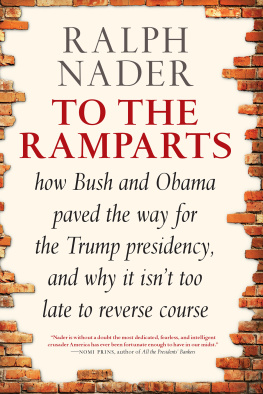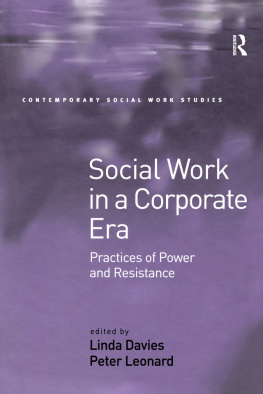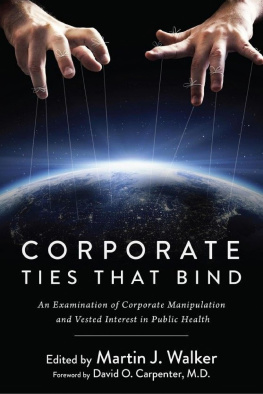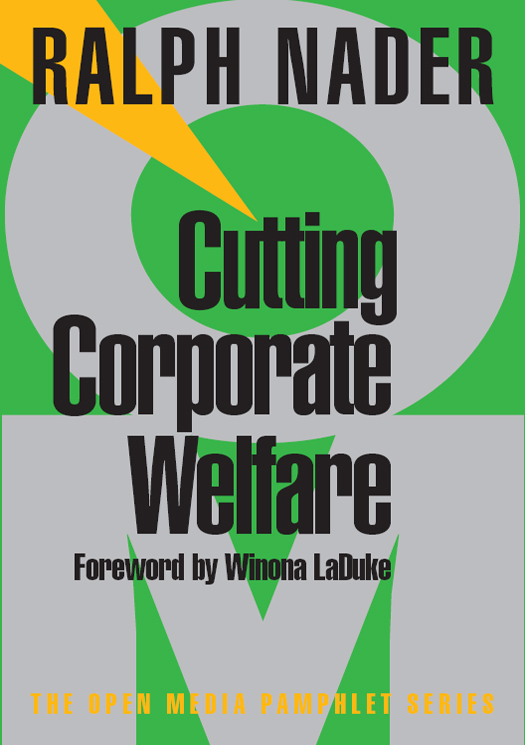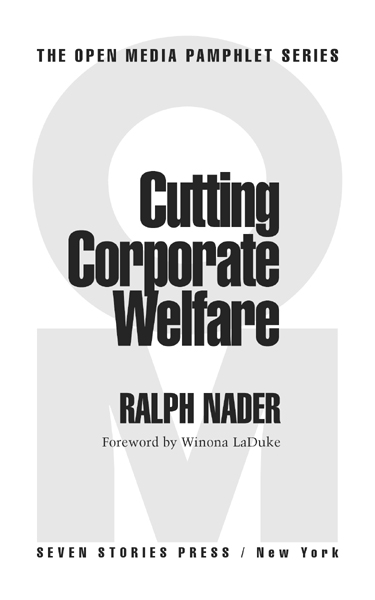Copyright 2000 by Ralph Nader
Foreword 2000 by Winona LaDuke
A Seven Stories Press First Edition
Open Media Pamphlet Series editor Greg Ruggiero.
Seven Stories Press, 140 Watts Street, New York, NY 10013;
www.sevenstories.com and www.sevenstories.com/textbook
All rights reserved. No part of this book may be reproduced, stored in a retrieval system, or transmitted in any form, by any means, including mechanical, electric, photocopying, recording or otherwise, without the prior written permission of the publisher.
Library of Congress Cataloging-in-Publication Data
Nader, Ralph.
Cutting corporate welfare / Ralph Nader.Seven Stories Press 1st ed.
p. cm. (Open media pamphlet series; 18)
eISBN: 978-1-60980-201-1
1. SubsidiesUnited States. I. Title. II. Series.
HC110.S9 N33 2000
338.97302dc21 00-020219
College professors may order examination copies of Seven Stories Press titles for a free six-month trial period. To order, visit www.sevenstories.com/textbook, or fax on school letterhead to (212) 226-1411.
v3.1
CONTENTS
FOREWORD by Winona LaDuke
Who gave them these rights? Why do their rights supercede mine?Loretta Pascal, Lilwat First Nation, in questioning the rights of logging companies to devastate her land, 1995
P ascals question is as contemporary as it is generations old: Why should the richest interests in the world have special rights and entitlements that ordinary citizens do not? Its the question that recently drove thousands into the streets of Seattle and Washington, D.C., and the question that has driven the indigenous communities of Mexico into rebellion since January 1994. For the past forty years, Ralph Nader has also asked this question. He has asked it with his writings, and he has asked it with his actions. In this pamphlet, Nader continues to ask this same question. He answers by directly confronting the U.S. governments practice of subsidizing big business, and by pushing for new laws that would protect from corporate intrusion the personal lives of the vast majority of people who do not have the budget to hire lobbyists to privilege their interests inside the beltway.
In Cutting Corporate Welfare, Nader reveals just how deeply private corporations have been drawing from the public trough, and the modus operandi of their practices. Nader describes how corporations siphon from our collective wealththe federal budget and many state and county assetswhile surveying the frontiers that they have yet to fully plunder, such as schools parks, the oceans, the Amazon, space, the wind, cyberspace, public attention and the federal budget.
Nader illustrates that it is not the mysterious hand of Adam Smith, or some sort of social Darwinism that permits corporate interests and the super-rich to appropriate public resources, but instead a series of misapplied laws and policies that uphold the centuries-old practice of concentrating wealth in the hands of a few. And, as Nader points out, it is in our power to change these laws.
From the first explorers who appropriated land for Christian kingdoms and a Christian God, to the antiquated 1872 Mining Act, laws and policies have been imposed to institutionalize private concentration of power. The Dutch West Indian Trading Company, the Northwest Company, and the Hudson Bay Company were just a few of the many early corporations that set out to make a fortune by institutionalizing unjust practices and laws. The dominance of these early trading companies in the New World continued for many generations, and included practices of economic destabilization, land appropriation, genocide, and drug dealing, that were supported by the colonial governments at the time. These corporations provided the financial footholds for some major monied interests today, and, in the case of the Hudson Bay Company, continue to this day as a primary economic power in many communities in northern Canada.
In 1862, then-President Lincoln made deals in the American west that opened up vast areas of Native lands to American settlers. It was the cattle barons who clearly benefited the most. With the passage of the Taylor Grazing Act, the cattle barons interests were scripted into public policy. Today, the legacy is painful: more than 270 million acres of public lands are used primarily by cattle ranchers at bargain basement prices$1.80 a month, or around $35 million totalfor use of those millions of acres. The private appropriation of public lands has led to a very privileged life for some, and massive loss for the rest of us.
That legacy continued when two years later, in 1864, Congress created the North Pacific Railroad Company and ordained that it should construct a railway from Lake Superior to Puget Sound. Along with this proclamation, Congress granted the North Pacific around 40 million acres of land, or 2 percent of the continent, which at the time was Native land. Today, we see the painful legacy of these holdings. Corporate descendants of the North Pacific RailroadBurlington Northern (the largest), and its associates Weyerhauser, Potlatch, Boise Cascade; and otherscontinue to clearcut vast areas of forested land, creating a patchwork of destabilized, traumatized ecosystems.
Is this democracy? No, but as Ralph Nader shows, it is through democracy that we can fight back. First with information, then with action.
Here, Ralph Nader presents the information. He offers a concise and cut-to-the-quick analysis that takes the mask off of corporate welfare, and allows us to see the outmoded public policies for what they areinvoluntary gifts from all of us to the rich. Based on testimony Nader gave to Congress, Cutting Corporate Welfare is a superb analysis and indictment of corporate power; it provides all of us with a tool to challenge the intrusion of these corporations into our lives, our ecosystems, and our economies.
CUTTING CORPORATE WELFARE
INTRODUCTION
C orporate welfarethe enormous and myriad subsidies, bailouts, giveaways, tax loopholes, debt revocations, loan guarantees, discounted insurance and other benefits conferred by government on businessis a function of political corruption. Corporate welfare programs siphon funds from appropriate public investments, subsidize companies ripping minerals from federal lands, enable pharmaceutical companies to gouge consumers, perpetuate anti-competitive oligopolistic markets, injure our national security, and weaken our democracy.
At a time when the national GDP is soaring, one in five children lives in deep poverty, one might expect that a public effort to curtail welfare would focus on cutting big handouts to rich corporations, not small supports for poor individuals. But somehow the invocations of the need for stand-on-your-own-two-feet responsibility do not apply to large corporations.
At a time when even growing federal budget surpluses do not persuade our nations political leaders to devote public resources to repairing and enhancing the built elements of our commonwealthsuch as the nations schools, bridges, clinics, roads, drinking water systems, courthouses, public transportation systems, and water treatment facilitiesone might expect to see calls to divert taxpayer monies from flowing into private corporate hands and instead direct them to crying public needs. But somehow the cramped federal budgetas well as similarly situated state and local budgetsalways has room for another corporate welfare program.








